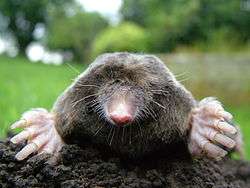Definify.com
Definition 2026
土竜
土竜
Japanese

The uguramochi variant was either dialectal, or a later development.
With the beginning of the Edo period and the shift in the political and cultural center to Edo, uguramochi was superseded by the eastern dialectal form muguramochi. The 1603 日葡辞書 (Nippo Jisho, “Japanese-Portuguese Dictionary”) lists one variant as mugura, indicating that the mochi portion could be dropped. This mugura then became mogura, possibly influenced by the verb 潜る (moguru).
Pronunciation
Alternative forms
Noun
土竜 (shinjitai kanji, kyūjitai kanji 土龍, hiragana もぐら, katakana モグラ, romaji mogura)
- (animal): a mole
Usage notes
Given the irregularity of the kanji reading, the もぐら spelling may be more common for this word in general use.
As with many terms that name organisms, this term is often spelled in katakana in biological contexts, as モグラ.
Synonyms
- 田鼠 (denso)
Derived terms
Etymology 2
| Kanji in this term | |
|---|---|
| 土 | 竜 |
| Grade: 1 | Grade: S |
| Irregular | |
Likely a shift in pronunciation from earlier eastern dialectal form muguramochi, possibly influenced by the verb 潜る (moguru).
Pronunciation
- (Irregular reading)
- (Tokyo) もぐらもち [mògúráꜜmòchì] (Nakadaka - [3])[1]
- IPA(key): [mo̞ɡ̃ɯᵝɾ̠a̠mo̞t͡ɕi]
Alternative forms
Noun
土竜 (hiragana もぐらもち, romaji moguramochi)
- (animal): a mole
Usage notes
The もぐら reading further above is more common for this word.
Etymology 3
| Kanji in this term | |
|---|---|
| 土 | 竜 |
| Grade: 1 | Grade: S |
| Irregular | |
Shortening of earlier eastern dialectal form muguramochi.
Pronunciation
- (Irregular reading)
- IPA(key): [mɯᵝɡ̃ɯᵝɾ̠a̠]
Alternative forms
Noun
土竜 (hiragana むぐら, romaji mugura)
- (animal, rare, possibly obsolete): a mole
Usage notes
The もぐら reading further above is more common for this word.
Etymology 4
| Kanji in this term | |
|---|---|
| 土 | 竜 |
| Grade: 1 | Grade: S |
| Irregular | |
Eastern dialectal form of earlier uguramochi reading. Appears in the 日葡辞書 (Nippo Jisho, “Japanese-Portuguese Dictionary”) published in 1603.[1]
Pronunciation
- (Irregular reading)
- IPA(key): [mɯᵝɡ̃ɯᵝɾ̠a̠mo̞t͡ɕi]
Alternative forms
Noun
土竜 (hiragana むぐらもち, romaji muguramochi)
- (animal, rare, possibly obsolete): a mole
Etymology 5
| Kanji in this term | |
|---|---|
| 土 | 竜 |
| Grade: 1 | Grade: S |
| Irregular | |
Older western Japanese dialectal reading. Also appears with this reading in the 日葡辞書 (Nippo Jisho, “Japanese-Portuguese Dictionary”) published in 1603.[1]
Pronunciation
- (Irregular reading)
- IPA(key): [ɯᵝɡ̃ɯᵝɾ̠a̠mo̞t͡ɕi]
Noun
土竜 (hiragana うぐらもち, romaji uguramochi)
- (animal, rare, possibly obsolete): a mole
Etymology 6
| Kanji in this term | |
|---|---|
| 土 | 竜 |
| Grade: 1 | Grade: S |
| Irregular | |
Variant of older western Japanese dialectal reading. Appears with this reading in the 玉葉和歌集 (Gyokuyō Wakashū, “Collection of Jeweled Leaves”) poetry compilation, completed in 1313-1314.[2]
Pronunciation
- (Irregular reading)
- IPA(key): [ɯᵝɡ̃ɯᵝɺ̠o̞mo̞t͡ɕi]
Alternative forms
Noun
土竜 (hiragana うぐろもち, romaji uguromochi)
- (animal, rare, possibly obsolete): a mole
Etymology 7
| Kanji in this term | |
|---|---|
| 土 | 竜 |
| Grade: 1 | Grade: S |
| Irregular | |
May be the oldest form. Appears with this reading in the 本草和名 (Honzō Wamyō), a pharmacopoeia compiled some time in the years 901-923.[1]
Derived as the 連用形 (ren'yōkei, “continuative or stem form”) of verb 墳つ (ugumotsu, uguromotsu, ugomotsu, ugoromotsu, “to become a pile or small hill, as of soil”). See above for further details.
Pronunciation
- (Irregular reading)
- IPA(key): [ɯᵝɡ̃o̞ɺ̠o̞mo̞t͡ɕi]
Alternative forms
Noun
土竜 (hiragana うごろもち, romaji ugoromochi)
- (animal, obsolete): a mole
Etymology 8
| Kanji in this term | |
|---|---|
| 土 | 竜 |
|
ど Grade: 1 |
りゅう Grade: S |
| on'yomi | |
From Middle Chinese compound 土龍 (thuX ljowng, literally “earth + dragon”). Compare modern Mandarin reading tǔlóng.
Pronunciation
- On'yomi
- (Tokyo) どりゅう [dóꜜryùù] (Atamadaka - [1])[1]
- (Tokyo) どりゅう [dòryúú] (Heiban - [0])[1]
- IPA(key): [do̞rjɯᵝː]
Noun
土竜 (hiragana どりゅう, romaji doryū)
- (animal, rare): a mole
- (rare): an earthworm
- (figuratively): an outstanding horse, an excellent horse, a famous horse (by metaphor from the meaning of the kanji)
Synonyms
References
- 1 2 3 4 5 6 7 2006, 大辞林 (Daijirin), Third Edition (in Japanese), Tōkyō: Sanseidō, ISBN 4-385-13905-9
- ↑ 1988, 国語大辞典(新装版) (Kokugo Dai Jiten, Revised Edition) (in Japanese), Tōkyō: Shogakukan
- 深根 輔仁 (Fukane Sukehito), editor (901–923) 本草和名 (Honzō Wamyō, Japanese Names of the Real Herbs) (in Japanese), Tōkyō: 紅葉山文庫 (Momiji Yama Bunko, Autumn Leaves Mountain Books), OCLC 728064858, published 1796.
- Doi, Tadao (1603–1604) Hōyaku Nippo Jisho (in Japanese), Tōkyō: Iwanami Shoten, ISBN 978-4-00-080021-1, published 1980.